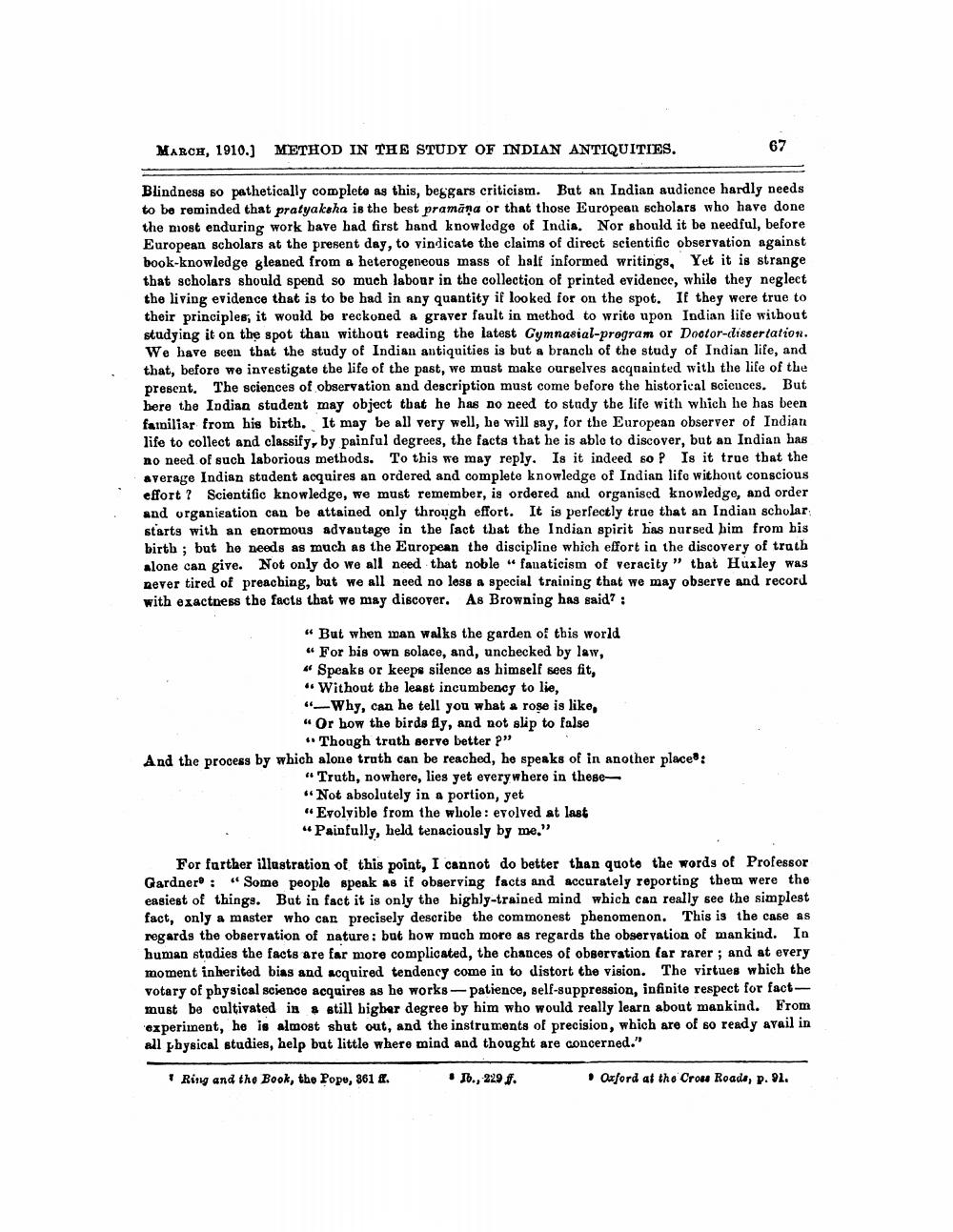________________
MARCH, 1910.] METHOD IN THE STUDY OF INDIAN ANTIQUITIES.
Blindness so pathetically complete as this, beggars criticism. But an Indian audience hardly needs. to be reminded that pratyaksha is the best pramana or that those European scholars who have done the most enduring work have had first hand knowledge of India. Nor should it be needful, before European scholars at the present day, to vindicate the claims of direct scientific observation against book-knowledge gleaned from a heterogeneous mass of half informed writings, Yet it is strange that scholars should spend so much labour in the collection of printed evidence, while they neglect the living evidence that is to be had in any quantity if looked for on the spot. If they were true to their principles, it would be reckoned a graver fault in method to write upon Indian life without studying it on the spot than without reading the latest Gymnasial-program or Doctor-dissertation. We have seen that the study of Indian antiquities is but a branch of the study of Indian life, and that, before we investigate the life of the past, we must make ourselves acquainted with the life of the present. The sciences of observation and description must come before the historical sciences. But here the Indian student may object that he has no need to study the life with which he has been familiar from his birth. It may be all very well, he will say, for the European observer of Indian life to collect and classify, by painful degrees, the facts that he is able to discover, but an Indian has no need of such laborious methods. To this we may reply. Is it indeed so? Is it true that the average Indian student acquires an ordered and complete knowledge of Indian life without conscious effort? Scientific knowledge, we must remember, is ordered and organised knowledge, and order and organization can be attained only through effort. It is perfectly true that an Indian scholar starts with an enormous advantage in the fact that the Indian spirit has nursed him from his birth; but he needs as much as the European the discipline which effort in the discovery of truth alone can give. Not only do we all need that noble "fanaticism of veracity" that Huxley was never tired of preaching, but we all need no less a special training that we may observe and record with exactness the facts that we may discover. As Browning has said?:
67
"But when man walks the garden of this world "For bis own solace, and, unchecked by law, "Speaks or keeps silence as himself sees fit, "Without the least incumbency to lie, "Why, can he tell you what a rose is like, "Or how the birds fly, and not slip to false "Though truth serve better ?"
And the process by which alone truth can be reached, he speaks of in another places:
"Truth, nowhere, lies yet everywhere in these "Not absolutely in a portion, yet
"Evolvible from the whole: evolved at last
"Painfully, held tenaciously by me."
For further illustration of this point, I cannot do better than quote the words of Professor Gardner: "Some people speak as if observing facts and accurately reporting them were the easiest of things. But in fact it is only the highly-trained mind which can really see the simplest fact, only a master who can precisely describe the commonest phenomenon. This is the case as regards the observation of nature: but how much more as regards the observation of mankind. In human studies the facts are far more complicated, the chances of observation far rarer; and at every moment inherited bias and acquired tendency come in to distort the vision. The virtues which the votary of physical science acquires as he works-patience, self-suppression, infinite respect for factmust be cultivated in a still higher degree by him who would really learn about mankind. From experiment, he is almost shut out, and the instruments of precision, which are of so ready avail in all physical studies, help but little where mind and thought are concerned."
Ring and the Book, the Pope, 361 f.
Jb., 229 f.
• Oxford at the Cross Roads, p. 91.




